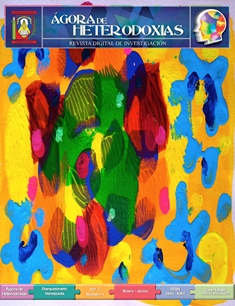New realities in postpandemic: emerging dynamics in teaching, production and dissemination of scientific knowledge
DOI:
https://doi.org/10.5281/zenodo6480571Keywords:
New realities in postpandemic, Teaching alternatives, Production and socialization of knowledgeAbstract
There have been many dynamics that have arisen as a result of the COVID-19 pandemic in the world,
this situation has generated new educational stakes and dynamics to which researchers have had to adapt for
the production and dissemination of knowledge and to be able to respond to current social problems. In this
context, humanity has been transformed in terms of access to information and socialization mechanisms,
with this teaching has also been evolving and presenting technologically with alternatives, but at the same
time, various emotional conditions that have left the confinement to which people have been subjected have
also arisen. Without failing to highlight the hope that has been maintained despite the emotional wounds
and dizzying changes in the dynamics of life, which demand the management of major changes from
teaching, access to information, production and socialization of knowledge and thus be able to mitigate the
consequences of the pandemic, which has affected all social orders and human beings in general.
Downloads
References
Caicedo, J. (2021). Teletrabajo y la productividad pos-pandemia. https://repository.unimilitar.edu.co/bitstream/handle/10654/38761/CaicedoJenniferAstrid2021.pdf?sequence=1&isAllowed=y
Cuantindioy, J., González, L., Muñoz, J., y Díaz, I. (2019). Plataformas virtuales de aprendizaje: Análisis desde su adaptación a estilos de aprendizaje. Revista Venezolana de Gerencia (RVG), 24(2), 488-501.
Garbanzo-Vargas, G. (2015). Desarrollo organizacional y los procesos de cambio en las instituciones educativas, un reto de la gestión de la educación. Revista Educación, 40(01). https://www.redalyc.org/articulo.oa?id=44043204005
Guevara, H.; Huarachia, L.; Lozano, G. y Vértiz, J. (2019). Plataformas virtuales de aprendizaje: Análisis desde su adaptación a estilos de aprendizaje Revista Venezolana de Gerencia, 24(2), 488-501. https://produccioncientificaluz.org/index.php/rvg/article/view/31505/32588
Hernández, G. (2020). Gestión de las emociones en tiempos de pandemia y su impacto en el rendimiento académico. Revista de Investigación y Cultura, 9(4), 55-64. http://revistas.ucv.edu.pe/index.php/ucv-hacer/article/view/586
Martínez-Bustos, E., Carrasco-Sagredo, C. y Bull, M. (2018). Propuesta metodológica para implementar la primera fase del modelo de gestión del cambio organizacional de Lewin. Estudios Gerenciales, 34(146), 88-98. https://www.icesi.edu.co/revistas/index.php/estudios_gerenciales/article/view/2813
Sudria, Ida Bagus Nyoman, Redhana, I Wayan, Kirna, I, & Aini, Diah (2018), Effect of kolb’s learning styles under inductive guided-inquiry learning on learning outcomes. International Journal of Instruction, 11(1), Tur-key, Eskişehir Osmangazi University, pp 89-102. Esta obra está bajo una licencia de Creative Commons Reconocimiento-NoComercial- CompartirIgual 3.0 Unported. http://creativecommons.org/licenses/by-nc-sa/3.0/deed.es_ES
Tejada, N., y Tejada, F. (2011). El Problem Solving Estratégico, herramienta para gestionar el cambio en las Organizaciones, SIGNOS Investigación. Sistemas de Gestión, 3(1), 95-105. https://revistas.usantotomas.edu.co/index.php/signos/article/view/928#:~:text=El%20Problem%20Solving%20Estrat%C3%A9gico%20es,resultando%20ser%20efectivos%20en%20su
Published
How to Cite
Issue
Section
Copyright (c) 2021 Ágora de Heterodoxias

This work is licensed under a Creative Commons Attribution-NonCommercial-ShareAlike 4.0 International License.
![]() Authors keep their copyrights so articles can be reused for teacher and research purpose. Readers and users can also reuse articles for the same purposes but not for commercial purposes. Ágora de Heterodoxias has no responsibility on information given by collaborators which is not necessarily the point of view of the publication
Authors keep their copyrights so articles can be reused for teacher and research purpose. Readers and users can also reuse articles for the same purposes but not for commercial purposes. Ágora de Heterodoxias has no responsibility on information given by collaborators which is not necessarily the point of view of the publication



